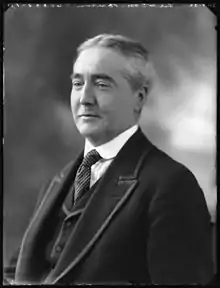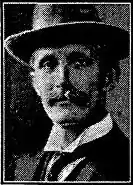Manchester Exchange (UK Parliament constituency)
Manchester Exchange was a parliamentary constituency in the city of Manchester. It returned one Member of Parliament (MP) to the House of Commons of the Parliament of the United Kingdom, elected by the first past the post system.
| Manchester Exchange | |
|---|---|
| Former Borough constituency for the House of Commons | |
| 1918–February 1974 | |
| Seats | one |
| Created from | Manchester North West |
| Replaced by | Manchester Central |
The constituency was created for the 1918 general election and abolished for the February 1974 general election.
Boundaries
1918–1950: The County Borough of Manchester wards of Cheetham, Collegiate Church, Exchange, Oxford, St Ann's, St Clement's, and St John's, and part of St Michael's ward.
1950–1955: The County Borough of Manchester wards of All Saints, Exchange, Medlock Street, Oxford, St Ann's, St Clement's, St George's, St John's, and St Luke's.
1955–1974: The County Borough of Manchester wards of All Saints, Beswick, New Cross, St George's, and St Peter's.
Members of Parliament
| Election | Member | Party | |
|---|---|---|---|
| 1918 | Sir John Randles | Coalition Conservative | |
| 1922 | Sir Edwin Stockton | Conservative | |
| 1923 | Robert Noton Barclay | Liberal | |
| 1924 | Edward Fielden | Conservative | |
| 1935 | Peter Eckersley | Conservative | |
| 1940 by-election | Thomas Hewlett | Conservative | |
| 1945 | Harold Lever | Labour | |
| 1950 | William Griffiths | Labour | |
| 1973 by-election | Frank Hatton | Labour | |
| Feb 1974 | constituency abolished | ||
Election results
Elections in the 1910s
| Party | Candidate | Votes | % | ±% | |
|---|---|---|---|---|---|
| C | Unionist | John Randles | 12,290 | 69.8 | |
| Liberal | Arthur Haworth | 5,326 | 30.2 | ||
| Majority | 6,984 | 39.6 | |||
| Turnout | 17,616 | 51.0 | |||
| Unionist win (new seat) | |||||
| C indicates candidate endorsed by the coalition government. | |||||
Elections in the 1920s

| Party | Candidate | Votes | % | ±% | |
|---|---|---|---|---|---|
| Unionist | Edwin Stockton | 13,919 | 57.8 | −12.0 | |
| Liberal | William Barton | 10,148 | 42.2 | +12.0 | |
| Majority | 3,771 | 15.6 | -24.0 | ||
| Turnout | 24,067 | 61.2 | +10.2 | ||
| Unionist hold | Swing | −12.0 | |||
| Party | Candidate | Votes | % | ±% | |
|---|---|---|---|---|---|
| Liberal | Robert Barclay | 12,248 | 54.0 | +11.8 | |
| Unionist | Edwin Stockton | 10,449 | 46.0 | −11.8 | |
| Majority | 1,799 | 8.0 | N/A | ||
| Turnout | 22,697 | 59.4 | −1.8 | ||
| Liberal gain from Unionist | Swing | +11.8 | |||
| Party | Candidate | Votes | % | ±% | |
|---|---|---|---|---|---|
| Unionist | Edward Fielden | 13,200 | 55.2 | +9.2 | |
| Liberal | Robert Barclay | 10,693 | 44.8 | −9.2 | |
| Majority | 2,507 | 10.4 | N/A | ||
| Turnout | 23,893 | 59.0 | −0.4 | ||
| Unionist gain from Liberal | Swing | ||||
| Party | Candidate | Votes | % | ±% | |
|---|---|---|---|---|---|
| Unionist | Edward Fielden | 13,691 | 39.9 | −15.3 | |
| Liberal | Robert Barclay | 11,112 | 32.4 | −12.4 | |
| Labour | Abraham Moss | 9,500 | 27.7 | New | |
| Majority | 2,579 | 7.5 | −2.9 | ||
| Turnout | 34,303 | 70.2 | +11.2 | ||
| Unionist hold | Swing | −1.5 | |||
Election in the 1930s
| Party | Candidate | Votes | % | ±% | |
|---|---|---|---|---|---|
| Conservative | Edward Fielden | 24,261 | 73.5 | +33.6 | |
| Labour | E.A. Gower | 8,727 | 26.5 | −0.8 | |
| Majority | 15,534 | 47.0 | +39.5 | ||
| Turnout | 29,497 | 66.2 | −4.0 | ||
| Conservative hold | Swing | ||||

| Party | Candidate | Votes | % | ±% | |
|---|---|---|---|---|---|
| Conservative | Peter Eckersley | 15,956 | 54.1 | −19.4 | |
| Labour | Eric L. Mendel | 8,313 | 28.2 | +1.7 | |
| Liberal | George Paish | 5,228 | 17.7 | New | |
| Majority | 7,643 | 25.9 | -21.1 | ||
| Turnout | 29,497 | 63.3 | −2.9 | ||
| Conservative hold | Swing | ||||
Election in the 1940s
General Election 1939–40:
Another General Election was required to take place before the end of 1940. The political parties had been making preparations for an election to take place from 1939 and by the end of this year, the following candidates had been selected;
- Conservative: Peter Eckersley
- Liberal: George Paish
- Labour: R McKeon
| Party | Candidate | Votes | % | ±% | |
|---|---|---|---|---|---|
| Conservative | Thomas Hewlett | Unopposed | N/A | N/A | |
| Conservative hold | Swing | N/A | |||
| Party | Candidate | Votes | % | ±% | |
|---|---|---|---|---|---|
| Labour | Harold Lever | 11,067 | 55.0 | +26.8 | |
| Conservative | Thomas Hewlett | 7,050 | 35.0 | -18.9 | |
| Liberal | Heric Kenyon | 2,018 | 10.0 | -7.7 | |
| Majority | 4,017 | 20.0 | N/A | ||
| Turnout | 20,135 | 70.3 | +7.0 | ||
| Labour gain from Conservative | Swing | ||||
Elections in the 1950s
| Party | Candidate | Votes | % | ±% | |
|---|---|---|---|---|---|
| Labour | William Griffiths | 18,335 | 54.1 | −0.9 | |
| Conservative | R.S. Harper | 13,716 | 40.5 | +5.5 | |
| Liberal | John Cooper | 1,812 | 5.4 | −4.6 | |
| Majority | 4,619 | 13.6 | −6.4 | ||
| Turnout | 33,863 | 74.8 | −8.5 | ||
| Labour hold | Swing | +4.5 | |||
| Party | Candidate | Votes | % | ±% | |
|---|---|---|---|---|---|
| Labour | William Griffiths | 18,475 | 55.4 | +1.3 | |
| Conservative | Idris W. Owen | 14,881 | 44.6 | +4.1 | |
| Majority | 3,594 | 10.8 | -2.8 | ||
| Turnout | 33,356 | 72.4 | −8.5 | ||
| Labour hold | Swing | +4.5 | |||
| Party | Candidate | Votes | % | ±% | |
|---|---|---|---|---|---|
| Labour | William Griffiths | 20,203 | 61.0 | +5.6 | |
| Conservative | Basil de Ferranti | 12,922 | 39.0 | −5.6 | |
| Majority | 7,281 | 22.0 | +11.2 | ||
| Turnout | 33,125 | 63.2 | −8.5 | ||
| Labour hold | Swing | +5.6 | |||
| Party | Candidate | Votes | % | ±% | |
|---|---|---|---|---|---|
| Labour | William Griffiths | 19,328 | 64.6 | +3.6 | |
| Conservative | Leonard Smith | 10,604 | 35.4 | −3.6 | |
| Majority | 8,724 | 29.2 | +7.2 | ||
| Turnout | 29,932 | 63.6 | −8.5 | ||
| Labour hold | Swing | +3.6 | |||
Elections in the 1960s
| Party | Candidate | Votes | % | ±% | |
|---|---|---|---|---|---|
| Labour | William Griffiths | 13,952 | 69.1 | +4.5 | |
| Conservative | Beata Brookes | 6,242 | 30.9 | −4.5 | |
| Majority | 7,710 | 38.2 | +9.0 | ||
| Turnout | 20,194 | 55.8 | −7.8 | ||
| Labour hold | Swing | +4.5 | |||
| Party | Candidate | Votes | % | ±% | |
|---|---|---|---|---|---|
| Labour | William Griffiths | 10,425 | 73.5 | +4.4 | |
| Conservative | John Stuart-Mills | 3,761 | 26.5 | −4.4 | |
| Majority | 6,664 | 47.0 | +8.8 | ||
| Turnout | 14,186 | 53.7 | −2.1 | ||
| Labour hold | Swing | +4.4 | |||
Elections in the 1970s
| Party | Candidate | Votes | % | ±% | |
|---|---|---|---|---|---|
| Labour | William Griffiths | 8,234 | 68.5 | −5.0 | |
| Conservative | William J. Loftus | 3,341 | 27.8 | +1.3 | |
| Independent | G.E. Spencer | 440 | 3.7 | New | |
| Majority | 4,893 | 40.7 | -6.3 | ||
| Turnout | 12,015 | 57.0 | −4.3 | ||
| Labour hold | Swing | −3.2 | |||
| Party | Candidate | Votes | % | ±% | |
|---|---|---|---|---|---|
| Labour | Frank Hatton | 5,348 | 55.33 | -13.20 | |
| Liberal | Michael Steed | 3,525 | 36.47 | New | |
| Conservative | William J. Loftus | 683 | 7.07 | -20.74 | |
| Marxist-Leninist (England) | Ruth Pushkin | 109 | 1.13 | New | |
| Majority | 1,823 | 18.86 | -21.86 | ||
| Turnout | 9,665 | ||||
| Labour hold | Swing | ||||
References
- "1973 By Election Results". Archived from the original on 14 March 2012. Retrieved 17 September 2015.
- Craig, F. W. S. (1983) [1969]. British parliamentary election results 1918-1949 (3rd ed.). Chichester: Parliamentary Research Services. ISBN 0-900178-06-X.
- Leigh Rayment's Historical List of MPs – Constituencies beginning with "E" (part 2)